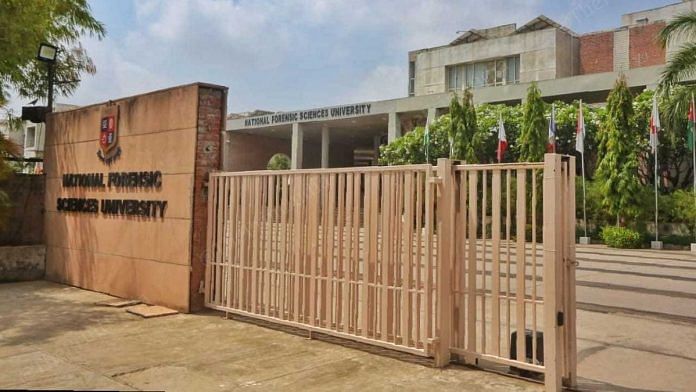Ahmedabad: It’s one of the most chilling crimes in recent times — a 21-year-old returning home from work on a two-wheeler was struck by a car in the early hours of 1 January 2023, and dragged for 13 km. The incident was caught on a CCTV camera.
Four people have been accused of murder, but it took Delhi Police some thorough forensic science to build their case. Helping them in the endeavour was a team from the National Forensic Sciences University (NFSU) in Gandhinagar, a focal point of the government’s efforts to sharpen forensic science in India and boost crime-solving.
The team helped Delhi Police recreate the crime scene, and provided technical assistance in reconstructing the sequence of events — how the victim, Anjali Singh, came under the vehicle and how she got stuck in a manner that she was dragged for 13 km.
“We informed and assisted the police through a demonstration of the crime scene and also alerted them about the places in the car from where samples needed to be collected, where her body touched,” said NFSU campus director S.O. Junare.
Experts at the NFSU have helped law enforcement with several high-profile cases, for example, the 2021 Republic Day violence and the Dhanbad case where a judge was killed by a speeding vehicle while on his morning walk.
Forensic science — the use of science to solve crime — is a field that can help crack the toughest cases.
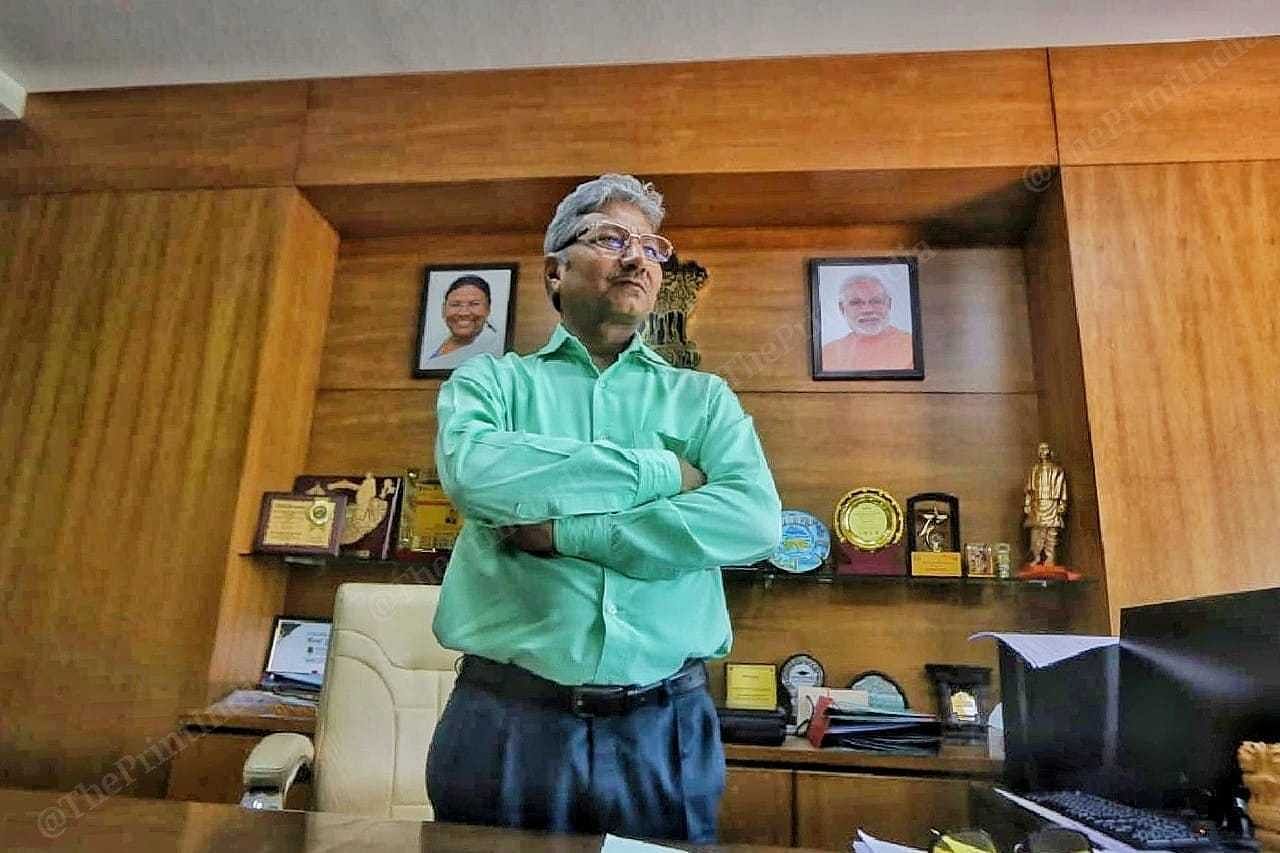
It can range from analysing the stomach contents of a cadaver to determine poisoning, to enhancing grainy CCTV footage for a positive identification. Crime scene reconstructions help law enforcement get new leads, while analysis of shell casings can identify the exact gun used in a crime.
Then there is the analysis of DNA, which often leads investigators straight to the criminal, and handwriting, as well as techniques to determine where exactly a certain drug was sourced from.
The field spans a wide gamut of activities, which require well-trained staff who can study crime scenes and carefully analyse evidence while protecting it from contamination.
This is where the NFSU comes in.
NFSU & its beginnings
The NFSU started in 2009 — when Narendra Modi was Gujarat chief minister — as a training and research centre under Gujarat University.
In 2020, the Modi government — which has emphasised the importance of integrating forensic investigation with the criminal justice system to increase conviction rates — upgraded it as a university.
Over the last three years, NFSU has established nine campuses, with five more set to come up in the next couple of years.
The campus in Gandhinagar stretches a sprawling 50,000 square metres, and is home to several centres of excellence — Centre for International Relations, Cyber Defence Centre (CDC), Centre of Excellence for Narcotics Drugs and Psychotropic Substances (NDPS), Ballistics Research & Testing Centre, International Centre for Humanitarian Forensics (ICHF), Centre for Futuristic Defence Studies, Forensic Innovation Centre, Investigative and Forensic Psychology lab.
At a time when forensic pendency is a major concern for Indian investigative agencies and courts, this university is working towards churning out skilled lab assistants and officers who are equipped with not just the knowledge of advanced forensic sciences, but also understand the importance of standardised forensic protocol. The aim is to ease the staff shortage in the field.
NFSU offers students specialised training in fields ranging from digital forensics to explosives forensics through over 65 courses. Its faculty and staff have been assisting central agencies like the CBI, the ED, the Income Tax Department, and the Directorate of Revenue Intelligence — as well as local police — even training them to collect scientific evidence in criminal and civil cases.
Earlier this year, NFSU supplied 15 mobile forensic vans to the Delhi Police and trained its personnel in using the multiple kits — rape test kit, mini digital forensics kit, voice analysis, and identification of fingerprints — as well as in determining injury patterns, gunshot wounds, and careful storage of samples from crime scenes.
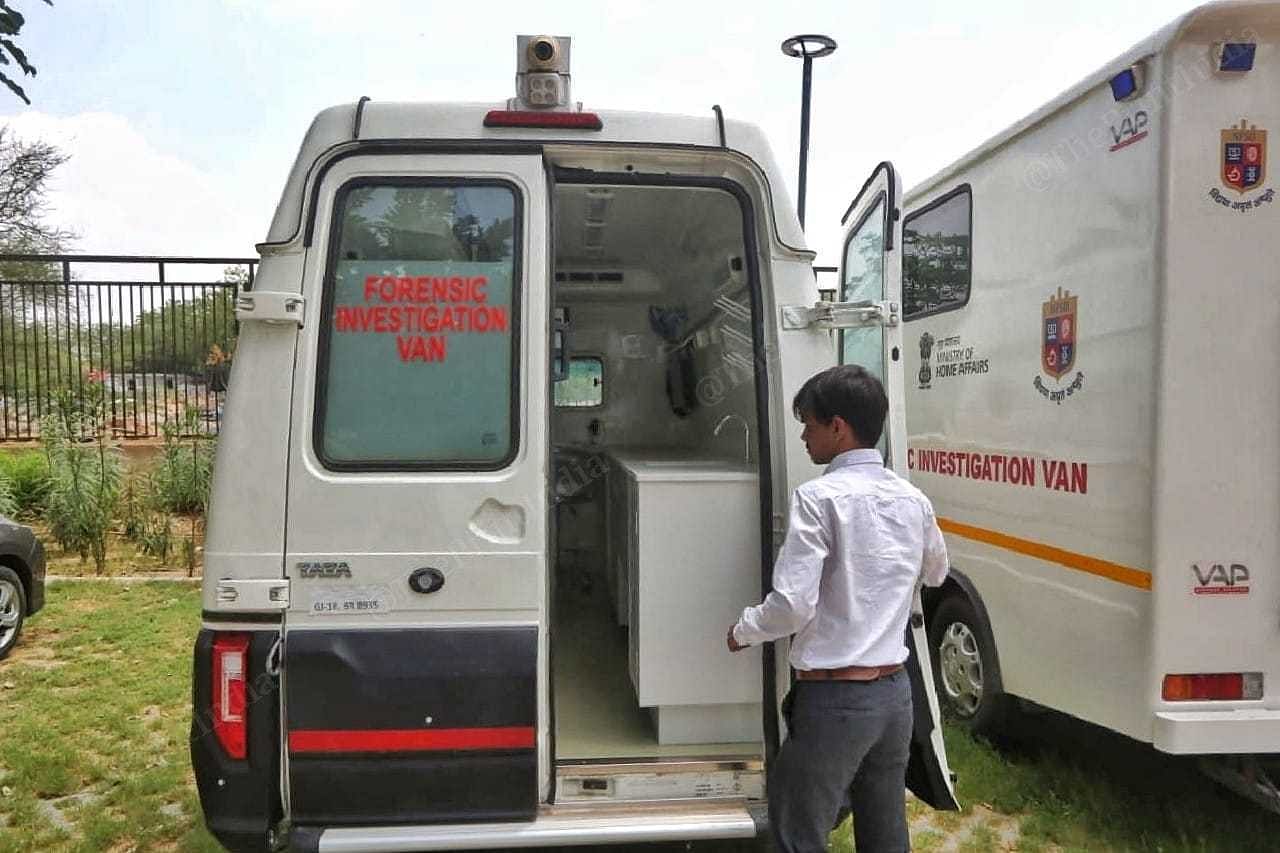
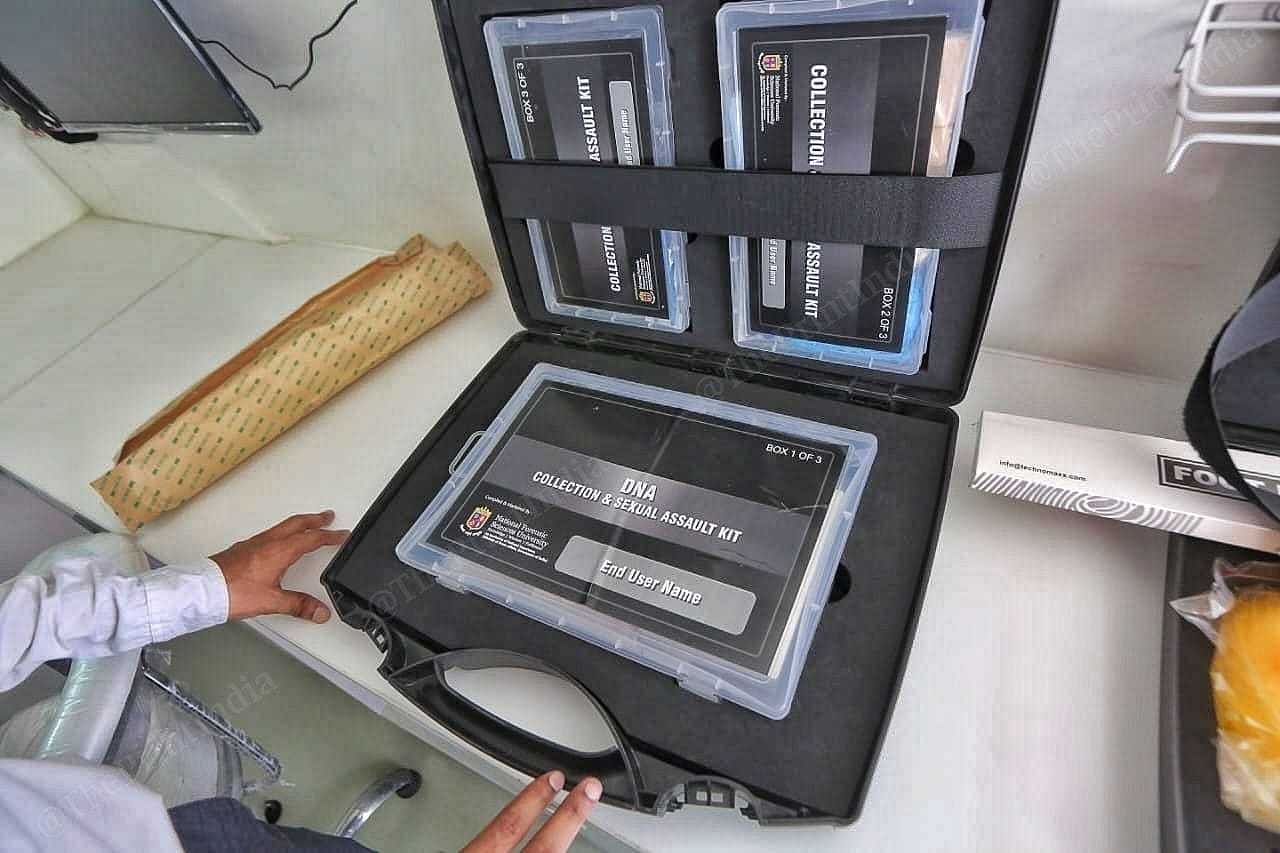
When ThePrint visited the university, batches of young Karnataka and Assam police personnel were attending workshops on the campus. Judges, bankers and auditors are also given training at the university.
“There is an urgent need to enhance the implementation of science and technology in solving crimes,” said NFSU campus director S.O. Junare. “This university was built with the mindset to fill up space for skilled manpower in forensics to assist agencies in solving crimes.”
According to Junare, 70 countries have been taking part in the workshops and programmes conducted at the university.
Also Read: Deleted photos, broken phones: How Delhi’s cyber-forensics lab helps crack ‘blind cases’
Tech on offer
Being on the NFSU campus makes one feel like they are in a procedural police drama.
When ThePrint visited, a brain-mapping session involving a 20-something suspect was underway. The man sat in a room, wearing a cap connected to electrodes, which in turn fed into an amplifier.
A lab assistant was hard at work setting the contraption in motion. Once it started, the suspect was given a set of statements. Two other lab assistants, meanwhile, monitored his brain activity on a screen as he read each of the statements out.
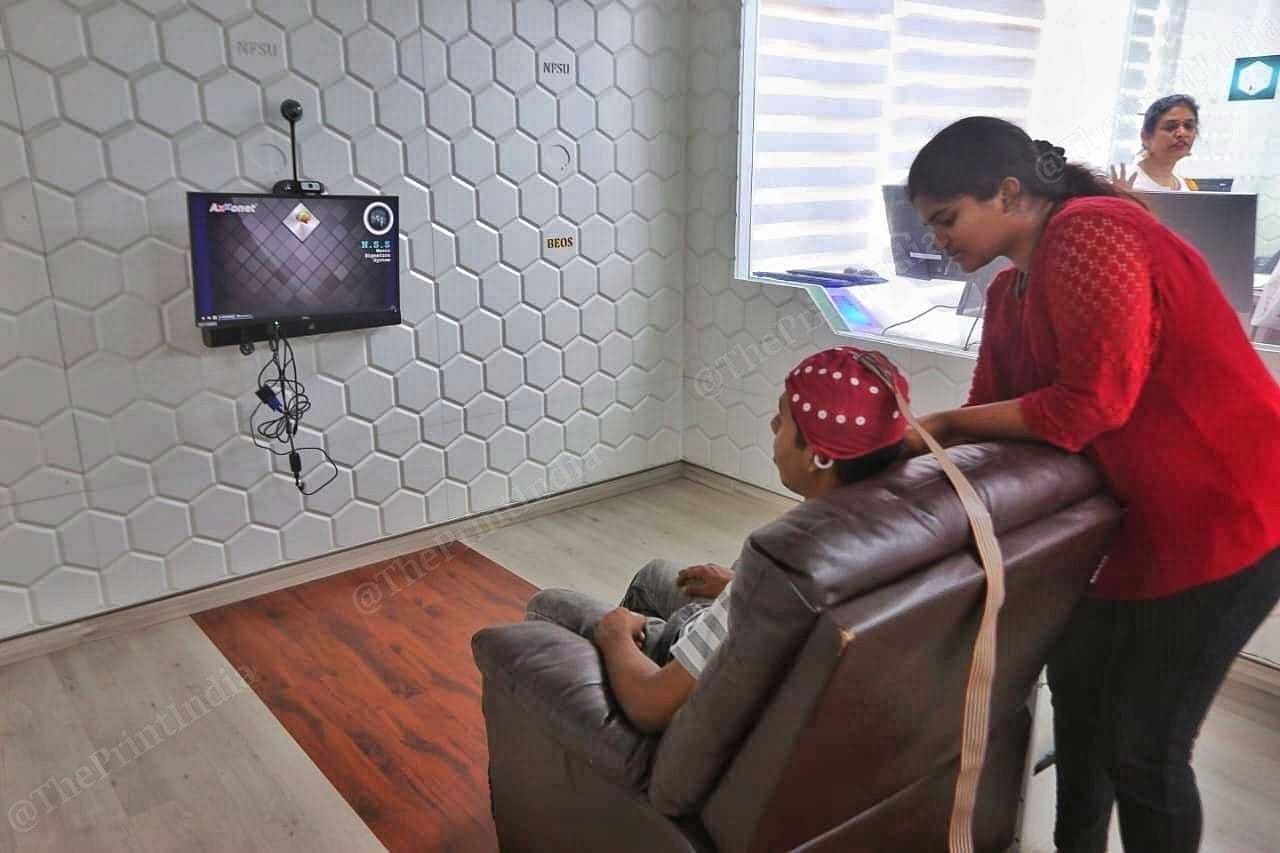
Forty minutes later, the system produced an “answer sheet”, which, researchers said, could hold clues to the suspect’s innocence (or lack thereof).
The test is called ‘Brain Electrical Oscillation Signature Profiling (BEOS)’, a technique developed by neuroscientist Champadi Raman Mukundan, said Associate Dean Priyanka Kakkar.
Among other things, some researchers claim BEOS can help expose someone’s “experiential knowledge” of a crime, or knowledge that would only be available to someone who participated in the crime. It is said to have an accuracy rate of 99.9 percent, although it’s still not sufficient to secure a conviction in courts.
The test, however, is not used in criminal cases alone. Kakkar said they even conduct BEOS on couples willing to take an infidelity test.
“There are two ways through which this test is conducted at NFSU,” Kakkar added. “One is to assist the prosecution through a court order and consent of the individual. In private cases, consent forms have to be signed by the individual undergoing the test.
Meanwhile, inside the Investigative and Forensic Psychology Lab, an assistant tried to analyse the results from a ‘visual face analyser’ that is said to read the expressions on the test-taker’s face.
Again, it involves participants responding to a set of questions, with lab assistants measuring their stress levels during the process.
Another technology on offer is the ‘suspect detection system’, which analyses skin responses like sweating to screen suspects in matters of border security.
Inside the Cyber Defence Centre is a mini war room where professors, innovators and lab assistants sit on over 10 systems and control the power grid. For the purpose of enhancing security around cyber attacks, the staffers form two teams — X and Y — and engage in online clashes of attack and defence. On the first floor, another team works on mobiles, laptops and other gadgets.
“We have multiple segments in digital forensics ranging from mobile forensics to computer forensics to IT forensics at the state and private level,” said Sanjiv Kanapatra, research assistant at NFSU.
“We have developed multiple scanning tools that establish multiple layers of infections on the device. We have multiple inhouse imaging tools.”
Junare said that not just with technology, “but with skilled manpower, we believe India’s forensic pendency will reduce by a great rate in the next couple of years”.
“Forensics — the scientific post-mortem of evidence — is the only way forward for faster delivery of justice and ensuring the convictions aren’t turned into acquittals in courts,” he added.
(Edited by Sunanda Ranjan)
Also Read: ‘Har Ghar Camera’— In Gorakhpur village, 103 CCTVs crack down on crime & romance


